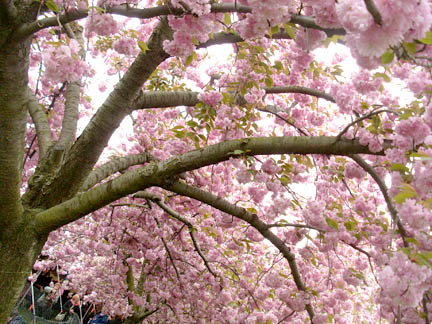Nawroz
March 24, 2009





Mercy
March 24, 2009

Its waves and everything else about it are overflowing. So say of it what you will without constraint.
It has two treatments: one of them removes it altogether without trace. The other suppresses it should it manifest itself.
To be adorned with the ornament of its cure, remember the extensive praise lavished upon forbearance & humility in Sacred Law, as well as in the poetry and prose of the wise. Indeed, remember that all of the prophets have been depicted as having both qualities.
Repel anger by perceiving at its onset that there is no one doing anything in reality except the Almighty; also by performing ablution with cold water, keeping silent, lying down (if ones is sitting) and sitting if one is standing. It will pass by doing these things, and also by seeking refuge in God as was mentioned in the tradition.
Imam Mawlud is referring to ghadab, intense anger or wrath, which compares with a swelling mass of emotion that is difficult to hold back once it is unleashed. Anger is truly an amazing phenomenon if one reflects on its nature and presence in human life and character.
A man asked the Prophet (s) said, What is the worst thing that once incurs concerning God? And he s replied, “His wrath” The man asked, How do we avoid it? The Prophet s replied, Do not become angry. This statement within itself reveals a world of correlation between Creator and creation. A parallel and correspondence that the All Merciful has imbibed and designed within the world Himself. Hence, if one wishes not to incur the wrath of God, then this person should not be wrathful or angry with people unjustly.
A man asked the Prophet s, Give me advice, He s replied, Do not become angry, & so it went 3 times in repitition.
The Prophet s also said, I am a human being and I become angry like you. The Prophet s’s anger could be seen on his face. But his anger was always in response to an aberration in human character or behavior offensive to God. So anger is not negative within itself, but if displayed incorrectly, it will be. If it is not guided to something useful, it can possess, consume, and ultimately destroy a person. How many people have we heard of who have ruined their lives because of a rash act or statement made in a fit of rage? How many people are completely estranged and avoided bc of their inability to control their anger.
Thus, anger is something that must be trained not abolished. For if people completely suppressed their anger, many of the injustices of the world would not have been opposed and tyranny would have gone unchecked. Corruption would cover the face of the earth.
We’re going to briefly delve into the four states of the soul.
When the rational soul is balance, the result is wisdom. Whoever is given wisdom is given much good (Q 2: 269)
Courage is when the irascible soul-anger- is under control. When a mean is struck between irrationality and cowardice, which is marked by fear overriding the anger required to courageously respond to exploitation, oppression, personal threats, and wrongdoing. There is a middle path bw these extremes.
Temperance is struck in the balance of the appetite and desire of the soul. The less you satisfy your desires of food and sexuality, the greater discipline you have instilled within your soul, and therefore a calmer, more purified heart, results in lesser chances of traits of sloth, lust, and anger surfacing.
God possesses both the traits of Mercy and Wrath. However, by in large, Gods mercy has always embraced His wrath. Therefore, we must reflect upon this as servants of the All-Merciful and incorporate such hikma, wisdom, into our own character. A blance is struck suitable for the complex societies that have spread across the face of the earth, a balance between ghadab and rahma. To take the straight way, one must have both, the law and the spirit of the law, the Sharia and the haqiqa. The law consists of rules, and the spirit of the law is mercy. God sent down the Sharia as a mercy, and the Prophet s himself is the mercy to the worlds ( 21:107). Thus, should our mercy embrace our wrath, or should our wrath embrace our mercy? Which is the way of God, which is the way of His beloved messenger?
The basic reasons why people get angry are thus forth, if ones primal needs of food, shelter and life are threatened, if ones position, dignity, and honor is threatened. And dignity is one asset that the Prophet s said about, “The believer does not humiliate himself.” – Which connotates either in talk or action.
Treatment:
The first cure is to remember the extensive praise and goodness associated with forbearance and humility. Sidi Ahmad al Zarruq claims the foremost reason people become angry is because they are filled with themselves, their egos get in the way. The ethic promoted here is to simply let go, not allowing insult ot penetrate and manipulate ones emotion. It is about keeping control, feeling secure. Simply remember, forbearance and humility are praised by the Maker of the heavens and the earth, and when He commends a certain behavior, do race to attain it.
One should also remember nothing occurs in this world without Gods leave, there is no power or might except with God. Thus, life is a series of trials, and those who are heedless of this react severely when trials come upon them.
The prophet s also advised, if one becomes angry he should sit down. And if he sitting, he should recline. If neither helps, then perform wudhu and then pray. The actual act of splashing water on our face reflects the inner reality of how water which coolness and light, puts out the fire of our nafs and ego within us, which represents Shaytan.
Mercy & Forgiveness:
To display mercy is to greatly reflect a divine attribute of God. Therefore, we should do so in ease & eagerness. On the Day of Judgement, after everyone has received their judgement & received their places either in Jannah or Jahannam, Allah azawajaal will turn around and with one hand grab a handful of people out of the fires of Jahannam and place them in the coolness and beauty of Jannah. Then the people will ask, Ya Allah, why have you done so, and He will say, For I am All Merciful, the most Merciful. When Allah azawajaal shows Mercy upon us, we do not wait to see why He is doing so, we simple grab it and hold on to it with all we can. In parallel, there are times when we must exercise mercy upon those around us, no matter if we think they deserve it or not. IF we do not, will we be shown mercy in the akhira?
When Prophet Ya’qub (as) received the news, along with the evidence to support it, that Yusuf (as) was alive, the lie that his brothers had kept concealed for so long came to light. They had told their father that he had been killed and eaten by wolves, whereas Yusuf (as) was actually still alive. When this emerged, his children begged Prophet Ya’qub (as) to forgive them:
They said, “Our father, may we be forgiven for all the many wrongs that we have done. We were indeed greatly mistaken men.” He said, “I will ask my Lord to pardon you. He is Ever-Forgiving, Most Merciful.” (Surah Yusuf: 97-98)
On close inspection, Prophet Ya’qub (as) said he would seek forgiveness not immediately but at a later time. Why should Prophet Ya’qub (as) not have sought forgiveness for his children straight away? The wisdom in this may have been that he wished to see what their subsequent behaviour and attitude would be. He may have wanted to see whether they had really abandoned the error of their ways and were truly sincere. For that reason, it may be that he would pray for them when he had formed that opinion (Allah knows best, of course).
Yet as is made clear at the end of the verse, Prophet Ya’qub (as) also reminded them of Allah’s compassionate and forgiving nature. He did that so that they might hope for forgiveness from Allah and turn to Him in sincere repentance.
Ya Mawlay!
March 8, 2009

| “Allah and His Angels send Salat (Blessings & Honours) on the Holy Prophet (Muhammad). O you who believe! Send your Salat (Durood Sharif) and Salaams on (Muhammad).” |
|---|
|
-Surah Al-Azhab, Ayah 56 |

Homesick.
March 7, 2009
After a life lived here.
After a world known here.
After understanding for decades what home means.
I realize,
I never knew home until I found it.
Once I found it, I could never bear to part.
A place, where the entirety of your essence,
Heart and Soul-
Are understood in beautiful ease…and love.
I never left.
Home, I will never leave.
Ya Makkah-i-Madani..
